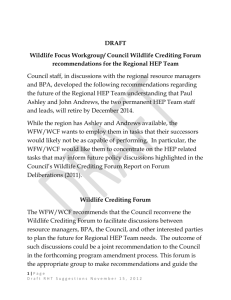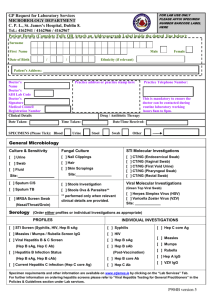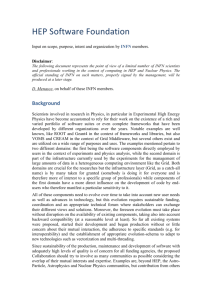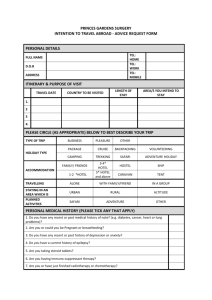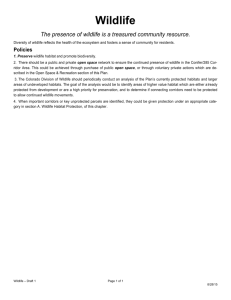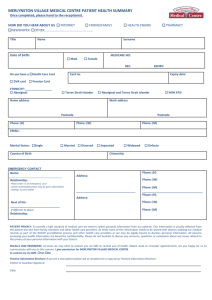Tracking Changes
advertisement
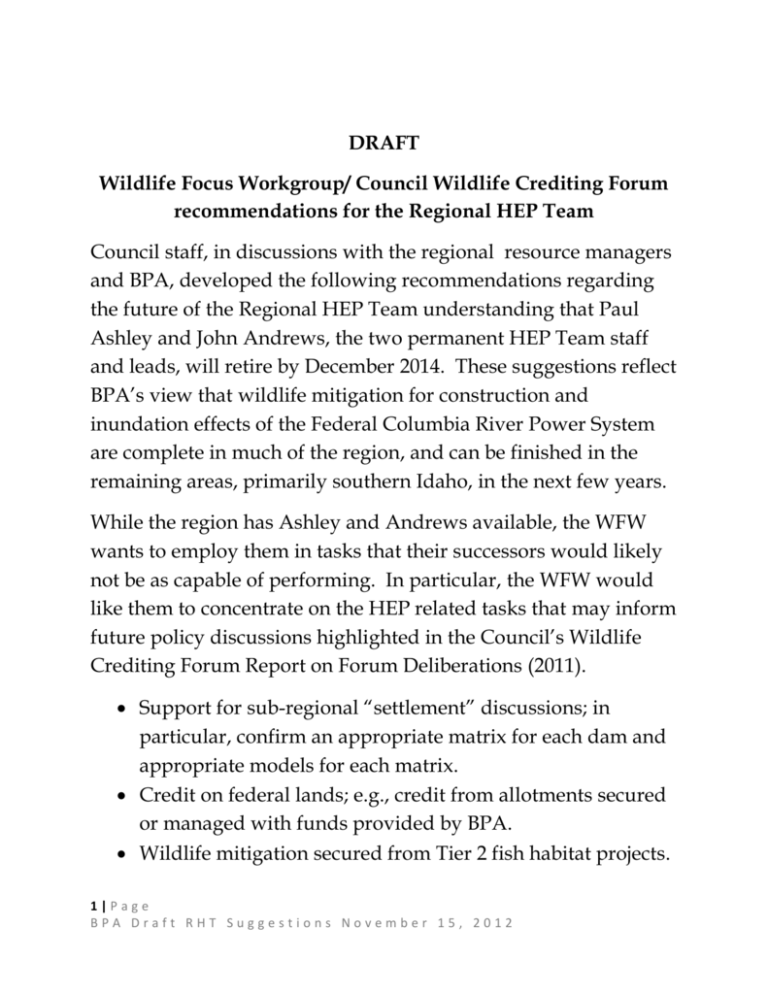
DRAFT Wildlife Focus Workgroup/ Council Wildlife Crediting Forum recommendations for the Regional HEP Team Council staff, in discussions with the regional resource managers and BPA, developed the following recommendations regarding the future of the Regional HEP Team understanding that Paul Ashley and John Andrews, the two permanent HEP Team staff and leads, will retire by December 2014. These suggestions reflect BPA’s view that wildlife mitigation for construction and inundation effects of the Federal Columbia River Power System are complete in much of the region, and can be finished in the remaining areas, primarily southern Idaho, in the next few years. While the region has Ashley and Andrews available, the WFW wants to employ them in tasks that their successors would likely not be as capable of performing. In particular, the WFW would like them to concentrate on the HEP related tasks that may inform future policy discussions highlighted in the Council’s Wildlife Crediting Forum Report on Forum Deliberations (2011). Support for sub-regional “settlement” discussions; in particular, confirm an appropriate matrix for each dam and appropriate models for each matrix. Credit on federal lands; e.g., credit from allotments secured or managed with funds provided by BPA. Wildlife mitigation secured from Tier 2 fish habitat projects. 1|Page BPA Draft RHT Suggestions November 15, 2012 Habitat unit allocation between lower four Columbia River dams, including allocation of pre-Act mitigation addressed in the Geiger Report. Other monitoring needs, such as effectiveness monitoring and species response to habitat acquisitions and enhancements. Wildlife Crediting Forum The WFW recommends that the Council may wish to consider reconvening the Wildlife Crediting Forum or continue with the WFW to facilitate discussions between resource managers, BPA, the Council, and other interested parties to plan the future for Regional HEP Team needs. The WFW believes the current model of a third party non-profit oversight of the Regional HEP team facilitates dialogue among all parties while allowing transparency and reduces the potential conflict of interest having a contract held directly with BPA or the managers. The outcome of such discussions could be a joint recommendation to the Council in the forthcoming program amendment process. This forum is the appropriate group to make recommendations and guide the Regional HEP Team into the future were work on operational losses will create a need for employment of new methods and technologies supported by the managers, BPA, and the ISRP. 2|Page BPA Draft RHT Suggestions November 15, 2012 Due to the forthcoming Fish and Wildlife Program amendment process that will begin in April 2013, the WFW makes specific suggestions for the first two years, with out-year suggestions guided by the following general principles. The need for additional HEP reports should drive future HEP Team funding. o The need for HEP on new acquisitions will diminish. Currently, BPA and the regional resource managers need some follow up HEP capacity to track project agreement compliance on many properties. That need may be influenced by two things. o First, long term settlements for operation and maintenance. o Second, technology advances may allow the region to more cost effectively track changes in habitat conditions using remote sensing or other techniques. The WFW does not expect the region to employ HEP to assess operational losses on fish or wildlife since the ISRP does not currently support expanded use of HEP, other pilot projects are already underway to explore how best to fulfill that specific need. o Depending upon results from ongoing pilot projects and the Council’s recommendations, it may be appropriate to task the Team to perform the technical testing and evaluation of operational loss models and methodologies, or other alternative habitat evaluation methods. 3|Page BPA Draft RHT Suggestions November 15, 2012 Regional HEP Team FY 2013: Maintain current RHT staffing and structure by keeping the current contract in place and in kind. Employ Wildlife Crediting Forum standard operating procedures that address variation and species stacking o Complete HEP reports for projects where data has been gathered already o Conduct baseline surveys and complete HEP reports for new 2012-2013 acquisitions o Complete Wildlife Crediting Forum Tier 1 fish habitat project HEP reports o Conduct follow-up HEPs on established projects with contested past HEP results o Aid BPA as needed in updating ledger with new information from new reports o Provide technical support for sub-regional wildlife settlement negotiations. Not all areas can be addressed in FY 2013. Lower four Columbia River dams Address pre-Act mitigation documented as recommended in the Geiger Report Southern Idaho Confirm an appropriate matrix, models, and model inputs for each dam Northern Idaho 4|Page BPA Draft RHT Suggestions November 15, 2012 Confirm an appropriate matrix, models, and model inputs Lower Snake o Develop and propose a plan for securely storing historic HEP reports, matrixes, models, and data for as many projects as feasible o Develop succession/transition plan for change in RHT leadership Hire potential HEP Team leader replacement in spring of 2013 to allow two field seasons of training. FY 2014: Maintain current RHT staffing and structure with new staff transitioning into leadership roles o Complete HEP reports for projects where data has been gathered already o Conduct baseline surveys and complete HEP reports for new 2013-2014 acquisitions o Complete WCF Tier 2 fish habitat project HEP reports based on list of projects prioritized by BPA and wildlife managers o Conduct follow-up HEPs on established projects with contested past HEP results o Aid BPA in updating ledger with new information from new reports o Continue providing technical support for wildlife settlement negotiations. 5|Page BPA Draft RHT Suggestions November 15, 2012 o Implement the plan for securely storing historic HEP reports, matrixes, models, and data for as many projects as feasible o Complete succession training for new RHT leadership 2015 and beyond: Team constitution and duties commensurate with regional need for ongoing HEP as assessed through the forthcoming program amendment process. The ISRP does not currently support an expanding role for HEP, so the region should not deploy HEP in working on operational losses; settlements may likely eliminate the need to rely on HEP extensively; and new technology may enable compliance monitoring with a reduced need for on-the-ground follow-up surveys. The Kalispel Tribe would like to enter the following comments regarding the November 28th Wildlife Focus Workgroup: 1. Reconvening the Wildlife Crediting Forum so the wildlife managers can contribute and discuss the direction of current and future issues regarding the wildlife mitigation in the Columbia Basin. Not all the land managers belong to CBFWA. Not all of the managers have been present and we need to be able to incentivize their return to a “working” wildlife group. 2. Ending the Regional HEP Team (RHT) after completion of current reporting requirements rather than perpetuate the house of cards we call HEP. It was never used as designed and carries no 6|Page BPA Draft RHT Suggestions November 15, 2012 weight in the conservation, protection, and restoration of species and habitats based on tabulated numbers. Crediting is a political issue and has little value to habitat and species management. This will all go away when settlements (MOA or MOU) are developed to finish mitigation and continue O&M. We need to incentivize managers and BPA to settle all remaining C&I impacts. 3. If there is a need to and the Wildlife Managers want to continue the RHT, then it should be under the Power Council not BPA or an independent non-profit group. We need to maintain an emphasis and connection to the Program and there is no non-profit or other group that can provide that better than the NPCC. 4. Based on past Habitat Units, future crediting discussions should be based on mutual agreement of what credits BPA should get and assurances for future reasonable O&M for the life of the project. 5. It is important that we support and implement the Council’s Program and not go off on tangents that detract us from doing the right thing. 6. We support the BPA Staff suggestions as far as finishing the current required RHT work and then ending the RHT. Hiring additional staff to continue the RHT will be a money and time better spent on mitigating impacts. We do think that the wildlife managers should get together and help the Council and BPA resolve issues concerning the Columbia River System and natural resources. ________________________________________ c:\users\paquet\dropbox\perc\hep comments\draft hep team plan revised pp.docx (Peter Paquet) H:\WORK\Wildlife\2012_1219atCBFWA\DraftHEPteamPlanMark-UpVersion.docx 7|Page BPA Draft RHT Suggestions November 15, 2012
